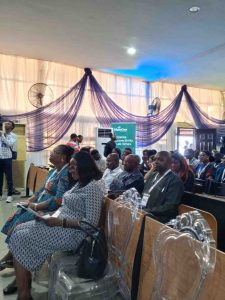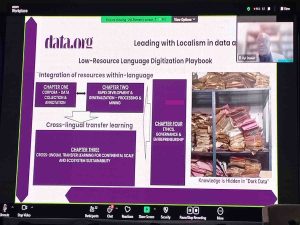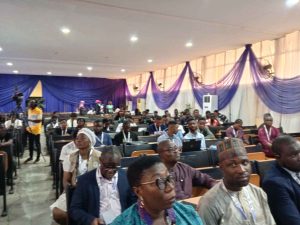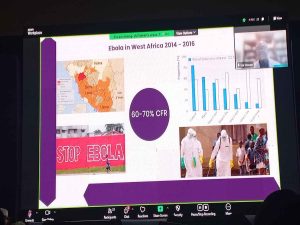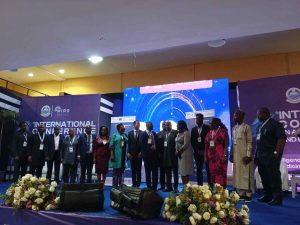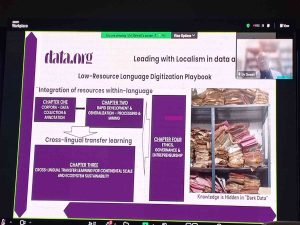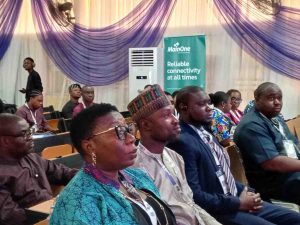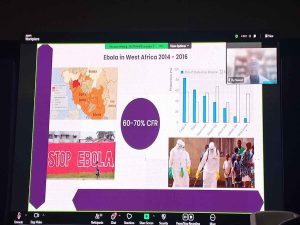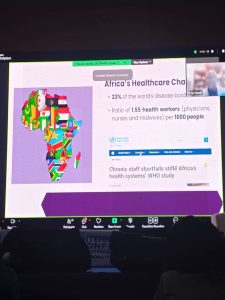Experts in the field of medicine, education and Information Technology (IT) have jointly aired their voice on the need to accept and utilise Artificial Intelligence (Ai) for advancement in medical practice in Nigeria.
The dons and medical experts revealed this at the 4th International Conference on Artificial Intelligence and Robotics (MIRG-ICAIR 2024) with the theme “Artificial Intelligence For the Future Industrialization of medicine in Sub-Saharan Africa”. The Conference was hosted and organized by the Machine Intelligence Research Group (MIRG) of the Department of Computer Science, University of Lagos (UNILAG) and NITHUB.

Opening the Conference, the Chairman, Local Organising Committee (LOC) of the Conference and Associate Professor in the Department of Computer Science, UNILAG, Dr. Victor Odumuyiwa, he said ‘’I am delighted to welcome you all to the 4th International Conference on Artificial Intelligence and Robotics (MIRG-ICAIR 2024) starting today at the University of Lagos with the theme “Artificial Intelligence for the Future Industrialisation of Medicine in Sub-Saharan Africa”.
‘’In a world marked by rapid technological advancements, the intersection of Artificial Intelligence and Medicine presents unprecedented opportunities for precision medicine and scaling of healthcare services. This conference serves as a platform for collaborative dialogue, knowledge exchange, and the exploration of ground-breaking ideas that will undoubtedly shape the future of our healthcare sector.
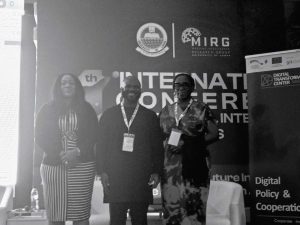
‘’MIRG-ICAIR 2024 is jointly organized by the Machine Intelligence Research Group (MIRG) of the Department of Computer Sciences and the NITDA IT Hub (NITHUB), University of Lagos. The conference aims to provide a platform for engagement and collaboration among researchers, industry professionals, government representatives, and innovators working at the intersection of AI and medicine. Together, we aim to co-create the future of healthcare systems and services in Sub-Saharan Africa, accelerating the achievement of SDG3 while making healthcare more accessible, efficient, and resilient.
‘’This conference is designed to provide participants with valuable knowledge and networking opportunities through a program featuring 5 keynote presentations, 4 panel discussions, and 27 research paper presentations.
‘’MIRG-ICAIR 2024 would not have been made possible if not for the volunteering efforts of the various committee members who worked tirelessly to ensure the success of the conference and we would like to sincerely appreciate them for their contributions.
‘’I would like to sincerely appreciate all our sponsors who provided all the needed support to make this event a success. Our principal sponsor DTC GIZ, you’ve been wonderful all along. I thank you so much for your great support. Mainone Solution by Equinix, Moniepoint, EduaIhub Nithub Data Science Nigeria, I thank you all. Once again I welcome you all to the 4th International Conference on Artificial Intelligence and Robotics.’’
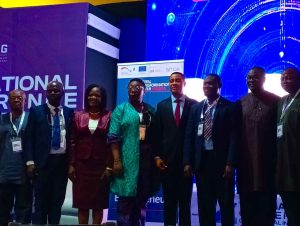
The keynote speech was given by Dr. Olatunji Omisore, renowned expert in Intelligent Systems from the Shenzhen Institute of Advanced Technology, Chinese Academy of Sciences, on how the world is going to be transformed by robotics and artificial intelligence (AI). He stressed that countries that do not adopt these technologies will automatically lag.
He said robotics have been applied in so many fields: military and security operations, agriculture, entertainment, and medicine. Dr. Omisore spoke specifically about the great impact that artificial intelligence would make in transforming healthcare, especially in diagnosis, surgical procedures, and rehabilitation.
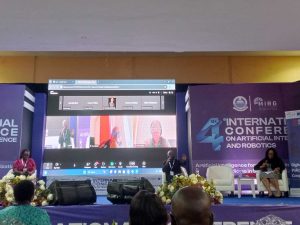
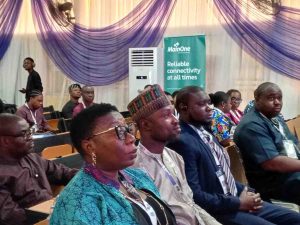
During the discourse, one of the panelists asked a very critical question: “How much are we spending in the health sector to achieve significant change?” Dr. Omisore stressed the importance of shifting the focus from importing foreign technology to fostering local innovation. He called for collaboration across sectors to build homegrown solutions, emphasizing the need for countries to look inward and invest in their own technological development to drive progress and self-sufficiency.
During the panelist section, the Dr. Omisore was asked if artificial intelligence (AI) posed as threat to people or if artificial intelligence (AI) will take jobs from people. He said, ‘’ artificial intelligence could pose itself as a threat to jobs but then it depends on the kind of policies and regulations that we have in place. It’s not really taking jobs, but it focus is on how it can improve productivity.’’
